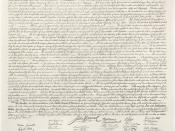American Independence is generally a phrase with strong positive connotations, and righteous ideas of liberty, equality, and freedom attached. Though these ideals were achieved for some, for the majority of people in the 13 colonies, it did not come close to embodying them. The independence won by the colonies directly benefited a small section of society consisting of the white and wealthy middle and upper classes. For the rest of society- consisting of women, slaves, Indians, and the vast working classes- the positive effects of independence were felt much later, while the negative effects were felt almost immediately. When each of these groups fought for their rights later on, they would reference the Declaration of Independence as a testament to their freedoms and rights. However, immediately after the Declaration and the Revolutionary War, none of these groups gained any "inalienable" rights. In fact, for many, the results of the war of independence were mostly negative.
It is clear to see the mixed effects of independence, when looking at how differently it affected a Shawnee Indian, a Carolina slave, a Boston dock Laborer, and a Salem merchant.
I. Shawnee Indian: The British had slowly been eating away at the Indian's land by signing and breaking thousands of treaties. This was done to keep land in the colonies scarce, so that masses of people would not flee to the wilderness and create their own settlements that did not create revenue for Great Britain. Laws like the Proclamation of 1763 were attempts to stop the colonial exploration of Indian land. During the revolutionary war, the many different tribes of Indians were divided as they got caught up in supporting different sides of the war. Encouraged by the British to attack the colonists, many Indian tribes were on bad relations with the...


